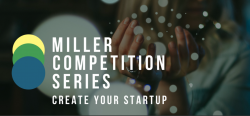Students Take Home Big Prizes During Business Model Competition
PROVO, Utah – Apr 14, 2021 – While growing up in Hazen, Arkansas, entrepreneurial management senior Alex Thompson watched his dad struggle with the water chemistry of their above-ground pool. This experience gave Thompson the idea for Armano, a device that monitors chemical levels in pools. Thompson’s product idea was one of hundreds submitted to the Business Model Competition (BMC), hosted by the Rollins Center for Entrepreneurship and Technology at the BYU Marriott School of Business. Thompson and his team received first place in the competition and took home the $4,000 cash prize.
The Business Model Competition is the second stage of the Miller Competition Series. The BMC prompts students to design tests that validate their business ideas and then to make changes to their business models based on their findings. The final event for this year’s BMC was held virtually over Zoom in February 2021, and more than $20,000 was awarded in cash prizes. The second-place prize of $3,000 was awarded to Playlist Plus, a team led by Harrison Noble, and the third-place team, led by Chandler Rogers, received a $2,000 cash prize for their app, Tribe.
The competition first required students to go out into the real world and test their business ideas with potential consumers. “Playlist Plus is a marketing service that bridges independent music artists with playlist curators and millions of fans,” explains Noble, an entrepreneurial management senior from Seattle. “Our two main hypotheses were first, can we connect with hard-to-reach curators, and second, would artists and curators be interested in connecting via our platform? Most of our tests consisted of running Facebook ads, doing ABC tests on our website, emailing curators, and running submissions through our minimum viable product.” Noble’s team included his cofounder, Sam Sabin, a technology and engineering studies junior from Lehi, Utah.
The process of testing business hypotheses brought the students key insights about their potential consumers. “Initially, we thought that our device could be disruptive to a technician’s job and that technicians wouldn't want to adopt the device when installing a pool,” says Thompson. “However, after dozens of interviews with technicians, we learned that our product solves a big problem for them too—not just the pool owners. This observation was surprising to us, and we wouldn’t have gained the insight without talking to our customers.” Thompson’s team included two engineers: Derek Shields, a 2020 mechanical engineering graduate from Panama City, Florida, and Jaxon Smith, an electrical engineering senior from Grand Rapids, Michigan.
The top-five finalist teams were each assigned a mentor, and the mentors coached the teams for nine days before the final event. These mentors served as a valuable resource in helping the teams prepare for their final presentations. “We worked with Corbin Church, an entrepreneurship professor at BYU Marriott. He helped us define the problem that our product solves in an engaging, storytelling way,” says Thompson. “He knew this water-chemistry problem was personal to my team, so he encouraged us to tell our story while utilizing the data gathered through our primary and secondary research. Corbin helped take our presentation from a lukewarm presentation to a presentation that was relevant, purpose driven, and motivating.”
Thanks to the feedback received from their mentors and the overall process of testing and validation, the students gained invaluable insights from their participation in the BMC. “During the competition, we learned how to be willing to move quicker than normal,” says Rogers, a junior from Gig Harbor, Washington, majoring in strategic management. “The lean startup principles taught throughout the BMC process helped push us out of our comfort zone and taught us how to pivot.” Rogers team included his wife, Jade Rogers, an entrepreneurship senior from Clarksburg, Maryland, and Jace Kendrick, a computer science junior from Houston.
The competition gave Rogers and his team the motivation to launch their product—an app called Tribe that helps people struggling with pornography find support through team-based connection and accountability. “No founder ever feels fully prepared or ready to launch a new product. However, we came to understand that feeling this way is okay,” Rogers says. “Going forward, we plan to launch Tribe to the Apple App Store and the Google Play Store this month. We know the product isn't perfect yet, but we’re excited to obtain real users who can give us real feedback.”
Media Contact: Chad Little (801) 422-1512
Writer: Sarah Calvert




